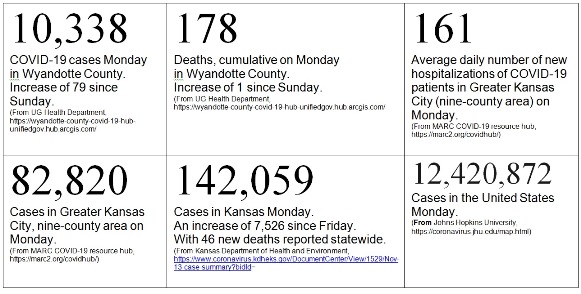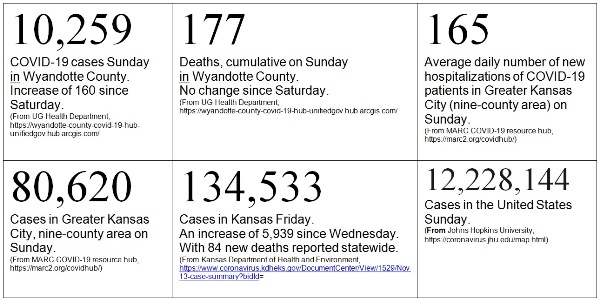
One hundred active COVID-19 patients were in the hospital Monday morning at the University of Kansas Health System, up from 78 on Friday.
Dr. Dana Hawkinson, medical director of infection prevention and control, said that of the 100 active patients in the hospital, which was an increase from 78 on Friday, there were 46 patients in the intensive care unit, an increase from 34 on Friday. Twenty-six of the ICU patients were on ventilators, up from 21 Friday. An additional 39 COVID-19 patients were hospitalized but were out of the acute infection phase, down from 47 on Friday. There also were a few COVID-19 deaths reported on the weekend at the hospital.
HaysMed in Hays, Kansas, reported 39 total COVID-19 patients, including three in the recovery phase, an increase from 35 on Friday.
According to the doctors, the high number of hospitalizations followed the surge in community cases in the past few weeks.
Doctors are hoping that mask orders and new restrictions in Kansas will slow the spread of COVID-19 and reduce the numbers of cases at the hospitals.
Local governments in the Kansas City area have issued new restrictions last week. Wyandotte County and Jackson County, Missouri, added a closing time of 10 p.m. for restaurants and bars, and a limit on gatherings of 10 persons. They already had a mask order and a social distancing order in effect here.
Mask-wearing and the new restrictions have the backing of local business groups including the Kansas City, Kansas, Area Chamber of Commerce and the Greater Kansas City Chamber of Commerce.
Last week, the governor announced a new mask mandate for the state. On Monday, a coalition of the Kansas Hospital Association, Kansas Chamber, Kansas Farm Bureau and Kansas Medical Society announced a public awareness campaign to urge residents to avoid large gatherings, use face coverings, distance and other health measures.
Alvey: ‘The virus is the enemy’
Mayor David Alvey, speaking at the Monday news conference, said there has been discussion about whether there needs to be governmental control or personal responsibility to handle the virus.
“I suggest it’s both,” he said. “Each one of us, if we would just simply comply with the mask mandate, follow protocols of infection control as you suggested, maintain social distancing, avoid large gatherings, we could simply turn the tide on this.”
As long as they don’t do this, they’re going to continue to face this sort of thing, he said.
Wyandotte County’s health order includes penalties of a $500 fine and 30 days in jail that could be, but are not often, enforced for violations.
“It’s too bad that people would expect us to solve this problem by enforcement,” Alvey said. “There’s not enough personnel to enforce everyone wearing the mask. That is each person’s responsibility to wear a mask, maintain social distancing and avoid gatherings.”
If they get a report of an event where people gathered in large numbers and did not wear a mask, the police will respond and have a conversation with them to remind them of the health order, and tell them they need to comply, he said.
“We try to avoid fines and so forth,” he said. “Let’s hope we don’t have to do that.”
There are some who are still struggling with the conflict of resisting the fact the virus is here and therefore are resisting the measures that were taken, he said.
Mayor Alvey said he had significant concerns about people who owned bars when a new restriction was put in place setting the closing time at 10 p.m., yet he also heard from many who encouraged him to take this action.
Wyandotte County was following the advice of health officers and chief medical officers in setting an earlier closing time, who felt that the longer time that people were in bars and restaurants, the more likely they were to have their masks off and spread the virus. Jackson County also followed the “Core 4” health officials group in the metro area, but the Johnson County Commission did not, and set their closing hour at midnight.
“There is still this resistance to the fact that we have to suffer this,” Alvey said. “As a nation, we’re not used to suffering.
“We think suffering itself is evil when in fact it’s something that causes the suffering is evil. The virus itself is the enemy,” he said.
“Our fellow citizen is not the enemy,” he said. “The virus is the enemy; let’s take the enemy as the enemy, and do what we need to do to stop it.”
There is a lot of resistance and anger, but people also are tired, Mayor Alvey said. People are getting upset when others are not complying, and that’s only going to increase, he said.
Also, the mayor said the latest he has heard about another stimulus package was that Senate leaders were willing to discuss the matter, with one side favoring trillions in relief, and another wanting to limit the amount to under 500 billion dollars.
“We do need to provide some wind to the sails of our small business,” he said. Until everyone is comfortable going out, they’ll continue to constrict their economic activity, he added. Until the vaccine is available, he’s not sure that people will go out much. There are safe ways to conduct business, as long as people follow the rules of infection control, he said.
Wyandotte County reported 79 additional COVID-19 cases on Monday, for a cumulative total of 10,338, according to the Unified Government COVID-19 webpage. There were a cumulative 178 deaths, an increase of one since Sunday.
The MARC Kansas City Region COVID-19 dashboard reported on Monday 82,820 total COVID-19 cases for the nine-county area and 1,032 total deaths. The seven-day average of cases per day was up, as well as the average daily news deaths. Hospitalization rates were trending down. Ventilator rates were up.
Kansas reported an additional 7,526 COVID-19 cases from Friday to Monday, according to the Kansas Department of Health and Environment statistics, for a cumulative total of 142,059. There were 1,456 cumulative deaths, an increase of 46 deaths since Friday.
“We are on fire in the Midwest,” Dr. Steve Stites, chief medical officer at KU Health System, said at the news conference. About a third of the COVID-19 patients at KU Health System are outside the Kansas City area, and the virus is spreading in rural America.
The surge of COVID-19 patients may make it harder for non-COVID-19 patients to receive medical care, he said. Hospital could soon run out of doctors and nurses who have been trained to take care of intensive care unit patients.
One way to put out that fire is to follow the rules of infection control, he said, including wearing masks, socially distancing, washing hands, not gathering in large groups and staying home when sick.
“We have this shared humanity where we’re all in things together, but for some reason we want to fight simple logic and truth. It’s odd to me because it’s a fool’s wisdom that takes us on a journey that says masks don’t work when there is so much evidence that proves that they do,” Dr. Stites said.
Vaccines discussed
The doctors also discussed news reports that showed AstraZeneca’s vaccine’s effectiveness rate was 90 percent in the late stage trials in Brazil, South Korea and England. The vaccine is being tested at the KU Medical Center and also at many locations in different countries. The AstraZeneca vaccine will not need to be stored at extremely cold temperatures.
Dr. Stites said the vaccine trial needs volunteers here. Volunteers are especially needed from minorities.
Dr. Hawkinson said the AstraZeneca vaccine uses a different vehicle to deliver the vaccine.
“We all are waiting for the final safety data but they all are looking safe at this point,” he said.
The AstraZeneca vaccine may be better for countries without as much infrastructure, as it will be easier to ship and to store, according to the doctors.
Dr. Stites said preliminary data of the vaccines seems to indicate that the lower doses are more effective than higher doses, but they will be waiting for final data.
Free COVID-19 testing available on Tuesday
Free COVID-19 testing will be available from 8 a.m. to 11 a.m. Tuesday, Nov. 24, at All Saints parish, 811 Vermont Ave., Kansas, City, Kansas.
The pop-up test is through Vibrant Health and the Wyandotte County Health Equity Task Force.
The Unified Government Health Department has moved its COVID-19 testing from the 6th and Ann location to the former Kmart at 78th and State Avenue in Kansas City, Kansas. The hours are 9 a.m. to 3 p.m. Monday through Friday. The test site will be closed on Thursday and Friday for the Thanksgiving holiday.
Tests are free for those who live or work in Wyandotte County. The tests are now saliva COVID-19 tests.
The tests now are open to asymptomatic people as well as those who have symptoms or have been exposed to COVID-19. Check with the UG Health Department’s Facebook page to see if there have been any changes in the schedule. Bring something that shows that you live or work in Wyandotte County, such as a utility bill.
For more information about the testing site at the former Kmart location, visit https://alpha.wycokck.org/files/assets/public/health/documents/covid/10092020_newtestingsitewyco.pdf.
The KU doctors’ news conference is at https://www.facebook.com/kuhospital/videos/205851577644412.
The new Wyandotte County health order with a limit of 10 persons to a gathering, and a closing time of 10 p.m. for restaurants and bars, with other new restrictions, is at https://alpha.wycokck.org/files/assets/public/health/documents/covid/11162020localhealthorderexecuted.pdf.
The UG COVID-19 webpage is at https://alpha.wycokck.org/Coronavirus-COVID-19-Information.
The KDHE’s COVID-19 webpage is at https://www.coronavirus.kdheks.gov/.
The KC Region COVID-19 Hub dashboard is at https://marc2.org/covidhub/.
The Wyandotte County page on the Johns Hopkins COVID-19 website is at https://bao.arcgis.com/covid-19/jhu/county/20209.html.
The CDC’s COVID-19 webpage is at https://www.cdc.gov/coronavirus/2019-nCoV/index.html.

